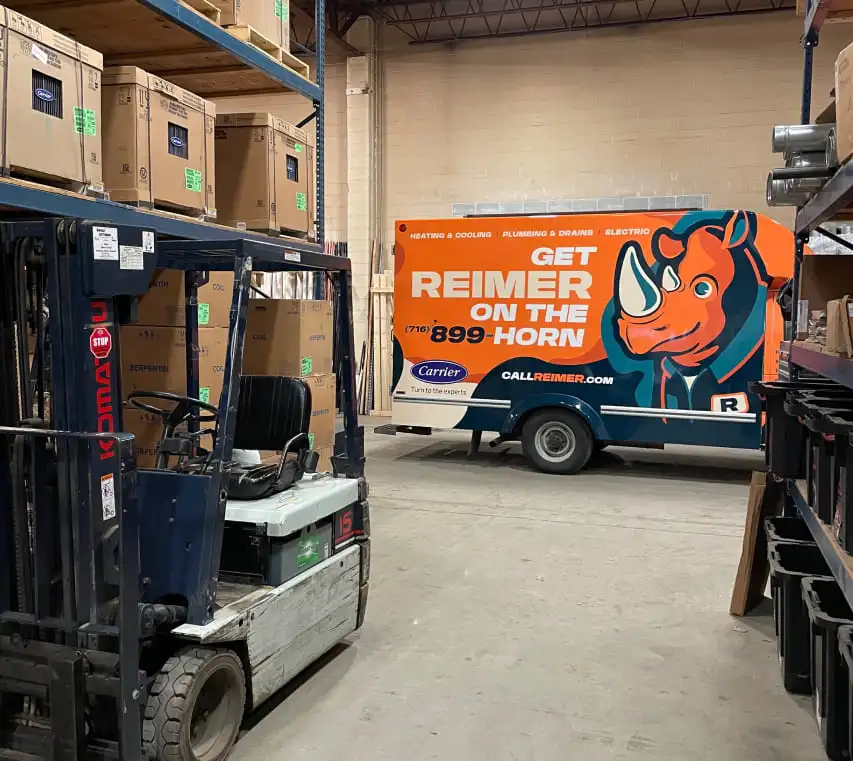As we dive headfirst into another beautiful Buffalo summer, let’s take a moment to ask a question we often ponder:
Is AC bad for the environment?
ACs are great for beating the heat—but it doesn’t come without environmental consequences.
Today, we’re exploring the ecological impact of AC use and what you can do about it.
The Role of AC Systems in Keeping Your Homes Cool
We Buffalonians know that our city’s weather isn’t for the faint-hearted.
While our winters may be famous (or infamous, depending on your perspective) for their snowfall, let’s not forget about our summers.
They can bring in some serious heat, and this is where our beloved air conditioning systems step in.
From our homes to our workplaces, supermarkets to our favorite local eateries, AC systems have become an integral part of our daily lives, ensuring we stay comfortable, focused, and cool, even in the height of summer.
There’s nothing like stepping into a refreshingly cool space after being out and about in the sweltering Buffalo summer.
However, despite their undeniable importance in our day-to-day lives, it’s essential to recognize the potential environmental implications of our collective AC use.
Local statistics indicate that almost 90% of New York homes have AC systems, a testament to our reliance on these machines.
However, as we demand more from our ACs, they draw more from our power grid, which predominantly relies on fossil fuels.
This is where the environmental dilemma of AC systems starts to become apparent.
Unpacking the Environmental Impact of AC Systems
Let’s break down the environmental impacts of AC systems, exploring the triad of issues – energy consumption, refrigerant use, and greenhouse gas emissions.
This holistic view may help us understand why these aspects matter and what we can do to make our AC usage more sustainable.
Energy Consumption
Our AC systems operate by consuming a significant amount of energy. But what exactly does this mean for Buffalo and our environment?
ACs and Energy Use: AC systems, especially during Buffalo’s summer, can account for a substantial part of our energy use. It’s estimated that New York homes use an average of 103 million BTUs annually—that’s 15% more than the national average.
Impact on Power Grid: This high energy demand puts a considerable strain on our power grid, leading to the need for increased power production, much of which is still reliant on fossil fuels.
Environmental Implications: High energy consumption results in increased carbon emissions, contributing to environmental degradation and climate change.
Refrigerant Use
Refrigerants are vital for your AC to work, but their environmental impact can be severe.
Role of Refrigerants: AC systems require refrigerants to cool the air. These substances absorb heat from the environment, providing us with that refreshing cool air we love.
Environmental Impact: When refrigerants are released into the atmosphere, either through leaks or improper disposal, they can contribute significantly to ozone layer depletion.
AC Units in Buffalo: With the hundreds of thousands of AC units across Buffalo, the potential amount of refrigerants that could escape into the atmosphere is substantial, posing a serious environmental concern.
Greenhouse Gas Emissions
AC systems, while not direct emitters of greenhouse gasses, contribute to these emissions indirectly through their high energy consumption.
ACs and Greenhouse Gases: AC systems use a lot of electricity, which is predominantly produced from fossil fuels. The combustion of these fuels leads to greenhouse gas emissions.
Buffalo’s Contribution: With our high reliance on AC systems, our beloved city of Buffalo can inadvertently contribute to the growing problem of global warming.
So, Is AC Bad for the Environment?
After discussing the environmental impact of AC systems—energy consumption, refrigerant use, and greenhouse gas emissions—you might be coming back to our initial question: Is AC bad for the environment?
To answer simply, yes, traditional AC usage does have negative environmental implications. However, it’s not a straightforward “good” or “bad” scenario.
While AC systems do contribute to environmental challenges like greenhouse gas emissions, they also play a crucial role in our lives, providing comfort, productivity, and in some cases, survival during intense heat waves.
While we’ve established that AC systems can indeed be harmful to the environment, it doesn’t mean we’re left without options or that we should start bracing ourselves for sweltering summers.
The key lies in mitigating these impacts—through regular AC tune-ups, responsible usage, and considering more sustainable cooling alternatives.
Enhancing Efficiency, Reducing Environmental Impact
The good news amidst all these environmental concerns?
You can make a significant impact through an AC tune-up—a simple yet effective measure. Let’s unpack the magic it holds:
Enhancing Efficiency
An AC tune-up is like giving your AC a full-body workout, enabling it to function at its best. It offers the following benefits:
Reducing Energy Consumption: Regular AC tune-ups can improve your unit’s efficiency by up to 15%. That means less energy consumption and lower carbon emissions. Plus, it can lead to noticeable savings on your energy bills!
Preventing Refrigerant Leaks: During an AC tune-up, we check for potential refrigerant leaks. This not only optimizes your AC’s performance but also prevents harmful refrigerants from escaping into the atmosphere.
Extending Lifespan
An AC tune-up isn’t just about enhancing efficiency; it’s also about longevity. Getting regular tune-ups can significantly extend your cooling system’s life. Its benefits include:
Preventing Early Replacement: Regular AC tune-ups can prolong the life of your AC, reducing the need for early replacements. This means less waste in our landfills and less energy and materials used in manufacturing new units.
Detecting Potential Issues: Tune-ups allow us to catch small problems before they escalate into significant issues, preventing sudden breakdowns and expensive repairs.
AC tune-ups are about more than just maintaining your comfort—they’re about caring for our environment, too.
Making a Difference with Everyday Actions
So, we’ve unpacked the environmental impact of AC systems, understood the magic of an AC tune-up, and explored sustainable alternatives. But what about our day-to-day AC usage?
Here are some simple tips that can make a big difference in reducing our environmental footprint:
Setting the Right Temperature
Believe it or not, even a slight adjustment in your AC temperature setting can have a significant impact on energy consumption.
Adjust your Thermostat: The Department of Energy recommends setting your thermostat to 78 degrees Fahrenheit when you’re home in the summer. Every degree below this can increase your energy consumption by up to 8%.
Use Programmable Thermostats: A programmable thermostat can automatically adjust the temperature when you’re out, reducing unnecessary cooling and saving energy.
Regular AC Tune-ups
Regular AC tune-ups play a vital role in maintaining your unit’s efficiency and reducing its environmental impact.
Schedule Routine Check-ups: Plan for a regular AC tune-up at least once a year. This improves efficiency, prolongs your AC’s life, and helps detect issues that might cause energy waste or refrigerant leaks.
Change Filters Regularly: A dirty filter makes your AC work harder than it needs to, consuming more energy. Regularly changing or cleaning your AC filters can improve its efficiency by 5-15%.
Be Mindful of the Sun
The sun’s heat can significantly impact your AC’s workload. Some simple adjustments can make a big difference.
Use Blinds and Curtains: Closing blinds and curtains, especially on the sunny side of your house, can prevent your home from heating up, reducing the need for cooling.
Install Solar Screens or Window Films: These can block a significant amount of solar heat, helping keep your house cool without extra energy consumption.
Using Ceiling Fans
Ceiling fans can be a great complement to your AC, allowing you to set your thermostat at a higher temperature without compromising comfort.
Use Ceiling Fans: They can make a room feel up to 10 degrees cooler while using just 10% of the energy of a central air conditioner.
Remember to Turn Them Off: Ceiling fans cool people, not rooms. So, make sure to turn them off when you leave the room to save energy.
The Benefits of Professional AC Tune-up Services
Opting for a professional AC tune-up comes with a multitude of benefits that go beyond just improving your AC unit’s efficiency. A professional service offers a comprehensive check that can identify potential issues that might not be apparent to the untrained eye.
This means small problems can be addressed before they evolve into more significant, costly repairs, prolonging the lifespan of your AC system. Furthermore, regular tune-ups can ensure that your system is functioning optimally, reducing energy consumption and, in turn, decreasing your carbon footprint.
Professionals are also adept at detecting and fixing refrigerant leaks—an often overlooked yet critical aspect of maintaining an eco-friendly AC system.
By preventing harmful refrigerants from escaping into the atmosphere, these tune-ups contribute to the well-being of our environment. The cumulative impact of a professionally maintained AC system goes beyond just your home; it positively impacts our community here in Buffalo and our planet.
Trust Reimer for Your AC Tune-ups!
When it comes to AC tune-up services, we at Reimer HVAC aim to strike a perfect balance between your comfort and sustainability.
Our experienced and skilled professionals offer comprehensive check-ups, ensuring your AC system is running as efficiently and effectively as possible. We are committed to catching minor issues before they turn into costly, energy-wasting problems.
Our services are designed with the environment in mind. We aim to minimize refrigerant leaks, uphold energy efficiency, and extend the life of your AC unit to reduce waste.
By choosing Reimer, you’re not only guaranteeing excellent service for your AC but also playing a part in reducing Buffalo’s carbon footprint.
Contact us today to make an appointment!
Also, contact us for any top-quality HVAC services in Buffalo, Amherst, Lockport, Cheektowaga, and Erie County.





